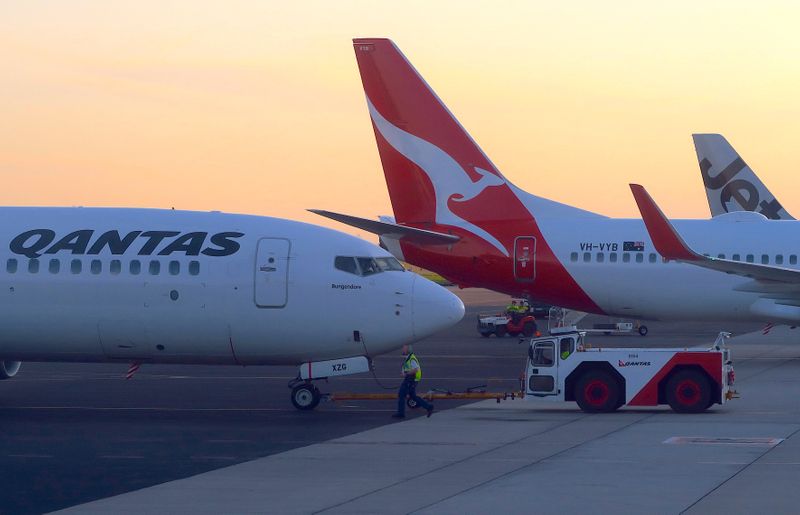Qantas Stock Soars to All-Time High as Profits Jump on Strong Travel Demand
Qantas Stock Soars to All-Time High as Profits Jump on Strong Travel Demand
By
Calder Monroe
Last updated:
August 28, 2025
First Published:
August 28, 2025

Photo: Investing.com
Record Stock Performance
Qantas shares surged to a historic peak on Thursday following the release of its full-year earnings report, underscoring the airline’s strong rebound from pandemic-era turbulence. The stock spiked as much as 13.6% in early trading before stabilizing to around 9% higher by midday. This marks one of the airline’s best single-day rallies in recent years, fueled by robust demand across both domestic and international markets.
Profits and Revenue Growth
For the year ending June 30, Qantas reported a 15% rise in underlying profit before tax to A$2.39 billion ($1.6 billion), slightly above analysts’ expectations of A$2.38 billion. Revenue climbed 8.6% to A$23.82 billion, driven by strong passenger numbers and higher fares amid sustained travel demand.
This is a remarkable turnaround compared to just a few years ago, when Qantas posted steep losses during the peak of the COVID-19 crisis. Analysts note that resilient travel appetite — particularly in premium cabins and long-haul routes — has been a key driver behind the airline’s recovery.
Generous Dividend Payout
Shareholders are set to benefit significantly from the airline’s improved financial health. Qantas announced a final dividend of 16.5 Australian cents per share along with a special payout of 9.9 cents, bringing the total payout for the year to 33 cents per share. This represents the largest annual dividend in 17 years, highlighting management’s confidence in the airline’s ongoing profitability.
Jetstar’s Standout Performance
Qantas CEO Vanessa Hudson pointed out that Jetstar, the airline’s low-cost subsidiary, delivered a “standout year.” Jetstar’s ongoing fleet renewal program boosted efficiency and earnings, contributing to a 55% surge in annual profits. The carrier flew a record 16 million domestic passengers, solidifying its role as a key growth engine for the Qantas Group.
However, not all operations fared equally well. Jetstar Asia, the airline’s Singapore-based unit, officially shut down on July 31 due to rising costs and stiff competition in the Southeast Asian market. Qantas framed the closure as part of its long-term strategy to recycle capital into higher-return segments, particularly domestic operations and fleet modernization.
Rising Costs and Challenges
Despite the strong profit figures, Hudson acknowledged challenges ahead. While global fuel prices have eased from 2022 highs, other operating costs have risen faster than inflation, reducing some of the benefits from cheaper fuel. Industry analysts warn that Qantas, like many global carriers, must navigate ongoing cost pressures while balancing growth investments.
Fleet Expansion and Premium Push
Looking to the future, Qantas has placed an order for 20 additional Airbus A321XLR aircraft, including 16 planes equipped with lie-flat business class seating. This signals a clear pivot toward boosting premium narrow-body capacity, particularly on medium-haul routes where competition from Asian and Middle Eastern carriers remains fierce.
The new aircraft are expected to provide improved fuel efficiency, lower operating costs, and better passenger experience — all of which support Qantas’ strategy to stay competitive in both leisure and business travel markets.
Legal and Regulatory Headwinds
The results arrive just weeks after Qantas was slapped with a record A$90 million penalty for illegally sacking 1,800 ground staff during the pandemic. While the fine underscores ongoing reputational and legal challenges, the airline’s financial strength has so far reassured investors that it can absorb such costs.
Outlook
With travel demand expected to remain strong into 2025, Qantas is positioning itself for sustained growth. Analysts forecast continued strength in premium demand, coupled with long-term benefits from its expanded Airbus fleet. However, cost inflation and potential regulatory scrutiny remain key risks to watch.
For investors, Qantas’ record-breaking performance, aggressive fleet strategy, and robust dividend payout make it one of the most closely watched airline stocks in the Asia-Pacific region.
Popular articles
Subscribe to unlock premium content
How Blue Bottle Coffee Became a $700M Specialty Coffee Icon

Gordon Moore: The Man Behind Moore’s Law and the Tech Revolution

How Shein Became a Fast Fashion Powerhouse Without Traditional Advertising

How Blue Bottle Coffee Became a $700M Specialty Coffee Icon

Gordon Moore: The Man Behind Moore’s Law and the Tech Revolution

How Blue Bottle Coffee Became a $700M Specialty Coffee Icon









